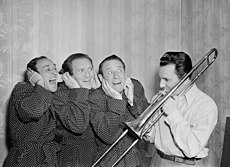
Melvin James Brooks is an American actor, comedian, filmmaker, songwriter, and playwright. With a career spanning over seven decades, he is known as a writer and director of a variety of successful broad farces and parodies. A recipient of numerous accolades, he is one of 19 entertainers to win the EGOT, which includes an Emmy Award, a Grammy Award, an Academy Award, and a Tony Award. He received a Kennedy Center Honor in 2009, a Hollywood Walk of Fame star in 2010, the AFI Life Achievement Award in 2013, a British Film Institute Fellowship in 2015, a National Medal of Arts in 2016, a BAFTA Fellowship in 2017, and the Honorary Academy Award in 2024.

The Three Stooges were an American vaudeville and comedy team active from 1922 until 1970, best remembered for their 190 short-subject films by Columbia Pictures. Their hallmark styles were physical, farce, and slapstick. Six Stooges appeared over the act's run : Moe Howard and Larry Fine were mainstays throughout the ensemble's nearly 50-year run; the pivotal "third stooge" was played by Shemp Howard, Curly Howard, Shemp Howard again, Joe Besser, and "Curly Joe" DeRita.

Elizabeth Ruth Grable was an American actress, pin-up girl, dancer, model and singer.

Silent Movie is a 1976 American satirical comedy film co-written, directed by and starring Mel Brooks, released by 20th Century Fox in the summer of 1976. The ensemble cast includes Dom DeLuise, Marty Feldman, Bernadette Peters, and Sid Caesar, with cameos by Anne Bancroft, Liza Minnelli, Burt Reynolds, James Caan, Marcel Marceau, and Paul Newman as themselves. The film is produced in the manner of a 20th-century silent film with intertitles instead of spoken dialogue ; the soundtrack consists almost entirely of accompanying music and sound effects. It is an affectionate parody of slapstick comedies, including those of Charlie Chaplin, Mack Sennett, and Buster Keaton. The film satirizes the film industry, presenting the story of a film producer trying to obtain studio support to make a silent film in the then-present 1970s.
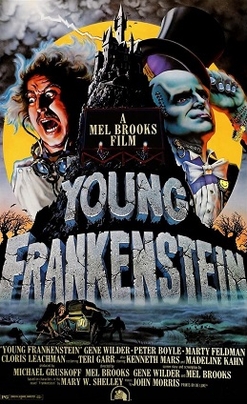
Young Frankenstein is a 1974 American comedy horror film directed by Mel Brooks. The screenplay was co-written by Brooks and Gene Wilder. Wilder also starred in the lead role as the title character, a descendant of the infamous Dr. Victor Frankenstein. Peter Boyle portrayed the monster. The film co-stars Teri Garr, Cloris Leachman, Marty Feldman, Madeline Kahn, Kenneth Mars, Richard Haydn, and Gene Hackman.
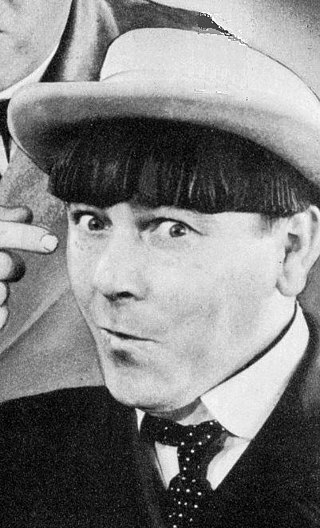
Moses Harry Horwitz, better known by his stage name Moe Howard, was an American comedian and actor. He is best known as the leader of the Three Stooges, the farce comedy team who starred in motion pictures and television for four decades. That group initially started out as Ted Healy and His Stooges, an act that toured the vaudeville circuit. Moe's distinctive hairstyle came about when he was a boy and cut off his curls with a pair of scissors, producing an irregular shape approximating a bowl cut.
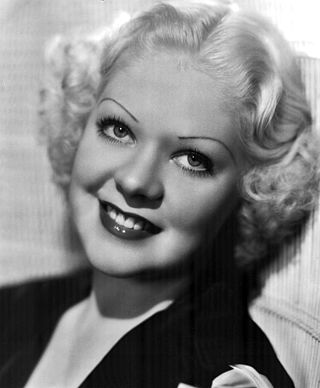
Alice Faye was an American actress and singer. A musical star of 20th Century-Fox in the 1930s and 1940s, Faye starred in such films as On the Avenue (1937) and Alexander's Ragtime Band (1938). She is often associated with the Academy Award–winning standard "You'll Never Know", which she introduced in the 1943 musical film Hello, Frisco, Hello.

Joseph Wardell, known professionally as Joe DeRita, was an American actor and comedian, who is best known for his stint as a member of The Three Stooges in the persona of Curly Joe DeRita.

The Gorilla is a 1939 American comedy horror film starring the Ritz Brothers, Anita Louise, Art Miles, Lionel Atwill, Bela Lugosi, and Patsy Kelly. It was based on the 1925 play of the same name by Ralph Spence.

Educational Pictures, also known as Educational Film Exchanges, Inc. or Educational Films Corporation of America, was an American film production and film distribution company founded in 1916 by Earle Hammons (1882–1962). Educational primarily distributed short subjects; it is best known for its series of comedies starring Buster Keaton (1934–37) and the earliest screen appearances of Shirley Temple (1932–34). The company ceased production in 1938, and finally closed in 1940 when its film library was sold at auction.

Blazing Stewardesses is a 1975 American sex comedy film directed by Al Adamson. Its title derives from the 1975 film The Naughty Stewardesses and the 1974 film Blazing Saddles.

Straight, Place and Show is a 1938 American comedy film directed by David Butler and starring the Ritz Brothers, Richard Arlen, and Ethel Merman, and released by 20th Century-Fox. It based on the unproduced play Saratoga Chips by Damon Runyon and Irving Caesar. It features a performance of the song "With You on My Mind" by Merman.

Down Argentine Way is a 1940 American musical film made in Technicolor by Twentieth Century Fox. It made a star of Betty Grable in her first leading role for the studio although she had already appeared in 31 films, and it introduced American audiences to Carmen Miranda. It also starred Don Ameche, The Nicholas Brothers, Charlotte Greenwood, and J. Carrol Naish.

You Can't Have Everything is a 1937 Fox musical film directed by Norman Taurog and produced by Darryl F. Zanuck. The film stars Alice Faye and Don Ameche, and was the film debut for Gypsy Rose Lee credited as Louise Hovick part of her birth name.
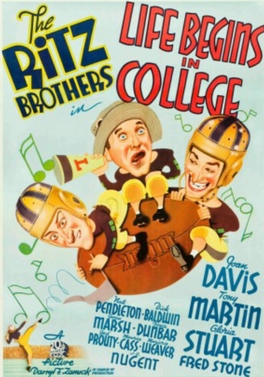
Life Begins in College is a 1937 American comedy film directed by William A. Seiter. It marked the Ritz Brothers' first starring role in a feature film.

Al Ritz, was an American comedian, actor and entertainer. Ritz was the oldest of the Ritz Brothers.
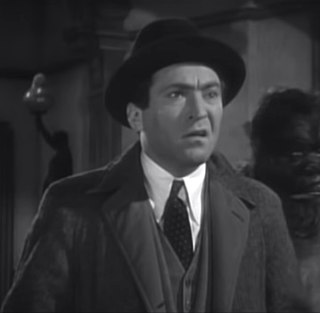
Harry Ritz, was an American comedian and actor. He was the youngest of the Ritz Brothers.

Jimmy Ritz, was an American comedian and actor. He was also the second Ritz Brother.

Argentine Nights is a 1940 musical film directed by Albert S. Rogell and starring The Andrews Sisters. It was their first film.
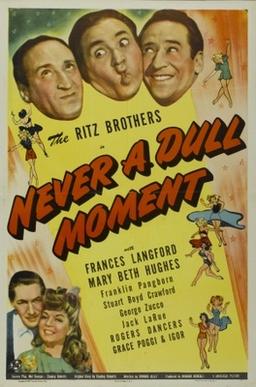
Never a Dull Moment is a 1943 American comedy film directed by Edward C. Lilley and written by Mel Ronson and Stanley Roberts. The film stars Ritz Brothers, Frances Langford, Mary Beth Hughes, Franklin Pangborn, Stuart Crawford, George Zucco, Elisabeth Risdon and Jack La Rue. The film was released on November 19, 1943, by Universal Pictures.
